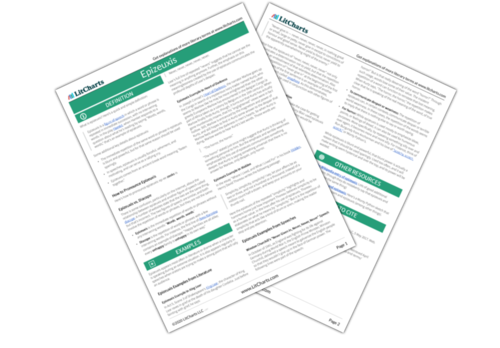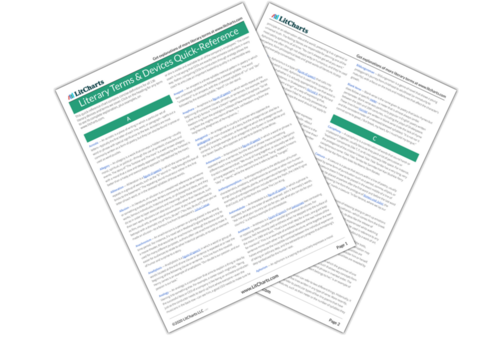Epizeuxis
Epizeuxis Definition
What is epizeuxis? Here’s a quick and simple definition:
Epizeuxis is a figure of speech in which a word or phrase is repeated in immediate succession, with no intervening words. In the play Hamlet, when Hamlet responds to a question about what he's reading by saying "Words, words, words," that's an example of epizeuxis.
Some additional key details about epizeuxis:
- The immediate repetition of the same word or phrase in epizeuxis is blunt and powerful, but for that same reason should be used sparingly.
- In speeches, epizeuxis is usually forceful, vehement, and motivating, and can serve as a rallying cry.
- Epizeuxis comes from an ancient Greek word meaning "fasten together."
How to Pronounce Epizeuxis
Here's how to pronounce epizeuxis: ep-ee-zooks-is
Epizeuxis vs. Diacope
There is some confusion, particularly on the Internet, about the relationship between epizeuxis and another figure of speech called diacope. A number of websites state that the two are the same thing, but that's incorrect. The two figures of speech are similar, and both involve the repetition of words or phrases, but they are not the same:
- Epizeuxis is the immediate repetition of words or phrases without any intervening words: "Words, words, words."
- Diacope is the repetition of words or phrases with a few intervening words. For instance, the first line of Anna Karenina contains an example of diacope: "Happy families are all alike; every unhappy family is unhappy in its own way."
Epizeuxis Examples
Epizeuxis appears most often in literature or drama when a character is speaking during an extreme situation. It is also appears regularly in speeches when orators are trying to make a strong point that will rally an audience.
Epizeuxis Examples from Literature
Epizeuxis Example in King Lear
In Act 5, Scene 3 of Shakespeare's King Lear, the character of King Lear raves in grief at the death of his daughter Cordelia. Just before fainting with grief, he says:
Never, never, never, never, never.
Lear's full line of repeated "nevers" suggests that he cannot see the meaning in anything anymore. Further, the emphasis on this meaninglessness created by the use of epizeuxis communicates the profound depths of Lear's despair.
Epizeuxis Example in Heart of Darkness
In Joseph Conrad's Heart of Darkness, the narrator Marlow goes up the Congo in search of a mysterious ivory trader named Kurtz, who seems to Marlow like he may be more enlightened than the other greedy Europeans Marlow has encountered in the Belgian Congo (a part of Africa taken as a colony by Belgium in the 19th century). When Marlow finally finds Kurtz, though, it turns out that Kurtz has actually gone murderously insane, that his "englightened" views were in fact hollow. Still, Marlow is entranced by the magnetism and power of Kurtz, and still hopes to find in Kurtz some answer to the despair that Marlow feels about the darkness in men's hearts. So when Kurtz is dying, Marlow wants to hear Kurtz's last words. Those words are:
"The horror, the horror."
"The horror" stated just once might suggest that Kurtz is thinking of something personal to him. But the emphasis and terrible weariness emphasized by this use of epizeuxis communicates something deeper, that Kurtz is saying something universal: that there is no answer for Marlow, only despair, only horror.
Epizeuxis Example in Walden
In the essay "Where I Lived, and What I Lived For" in his book Walden, Henry David Thoreau writes the following passage:
Simplicity, simplicity, simplicity! I say, let your affairs be as two or three, and not a hundred or a thousand; instead of a million count half a dozen, and keep your accounts on your thumb nail.
Here the epizeuxis of the repeated "simplicity" highlights and hammers home just how important Thoreau believes simplicity to be as a human value. In the lines after his use of epizeuxis, Thoreau elaborates on what he means by "simplicity." But it is the repetition of simplicity that acts like a kind of drum or siren, making the reader stop and pay attention.
Epizeuxis Examples from Speeches
Winston Churchill's "Never Given in, Never, Never, Never" Speech
In October of 1941, as England was fighting for its life against Germany during World War II, the English Prime Minister, Winston Churchill, delivered a speech meant to galvanize the English people so that they wouldn't give up in the face of German power. The following lines were part of the speech:
"Never give in — never, never, never, never, in nothing great or small, large or petty, never give in except to convictions of honour and good sense. Never yield to force; never yield to the apparently overwhelming might of the enemy."
Notice how the epizeuxis of "never, never, never, never" not only communicates a determination not to yield, but that the repetition itself is like an embodiment of that relentless determination. Also note that the repetition of "never give in" at the beginning of the first and second clauses of the first sentence is an example of another kind of figure of speech called anaphora. As this demonstrates, epizeuxis can, of course, be used in conjunction with other figures of speech.
Tony Blair's 2001 Speech on Education
In a 2001 speech in which he hoped to make the case for getting another term as prime minister of England, Tony Blair used epizeuxis to make very clear that his priority for his next term would be education:
If we are given a second term to serve this country, our mission will be the renewal of our public services. There is nothing more important to making Britain a fairer and stronger country.
Our top priority was, is and always will be education, education, education. To overcome decades of neglect and make Britain a learning society, developing the talents and raising the ambitions of all our young people.
Why Do Writers Use Epizeuxis?
Epizeuxis is not a subtle figure of speech. It's immediate repetition of the same word is more like a battering ram. Because of that, epizeuxis provides powerful, relentless emphasis. Writers can use this emphasis in different ways, though:
- To make clear a point: Epizeuxis allows a writer to quickly zero in on and share their point in a way that everyone hearing it will understand, as Tony Blair did with his "Education, education, education" line.
- To rally an audience: Chants are often examples of epizeuxis. For instance, if you're at a baseball game in Boston and hear, "Let's go Red Sox, Let's go Red Sox," that's epizeuxis. Speakers sometimes use epizeuxis to rally a crowd into joining them in a chant. Donald Trump's "Lock her up" chant involved just this sort of epizeuxis.
- To really insist on the meaning of a word: People use powerful words all the time. A person might step in dog poop and say, "the horror!" But is that really deserving of the word "horror?" Through such usage, words lose some of their value. The insistent repetition of a word can function to reinstate that lost meaning. When Kurtz says, "The horror, the horror," the repetition makes clear that he is speaking of the real meaning of the word, of true horror.
- To communicate despair or weariness: The repetition of epizeuxis can, in certain contexts, communicate despair or terrible world weariness. In these cases, the repetition of the words seems to imply that there is nothing else to say or worth saying.
- For humor: While epizeuxis is used mostly to emphasize ideas, points, or feelings of dread, it can also be used for humorous purposes. More specifically, by repeating something silly over and over again, it becomes more and more silly. For instance, think of Run Burgundy from Anchorman and his love of "scotchy, scotch, scotch," or Monty Python's.
While epizeuxis is blunt and powerful, that blunt power is actually a reason that it should be used sparingly. Used too often, and it will make writing seem hysterical and over the top, and its power will be wasted.
Other Helpful Epizeuxis Resources
- The Wikipedia entry of epizeuxis: Lots of good additional examples (though they do mistakenly say that epizeuxis and diacope are the same thing)
- Monty Python and epizeuxis: Here's a Monty Python sketch that delightfully mixes spam and epizeuxis (among other things).















